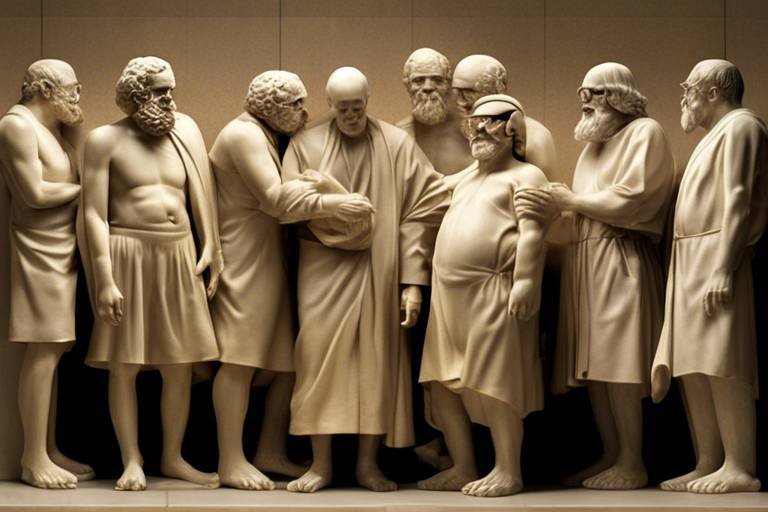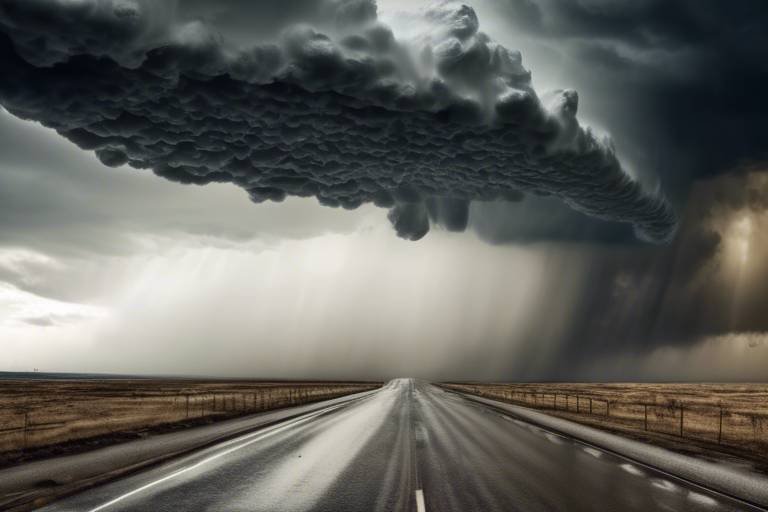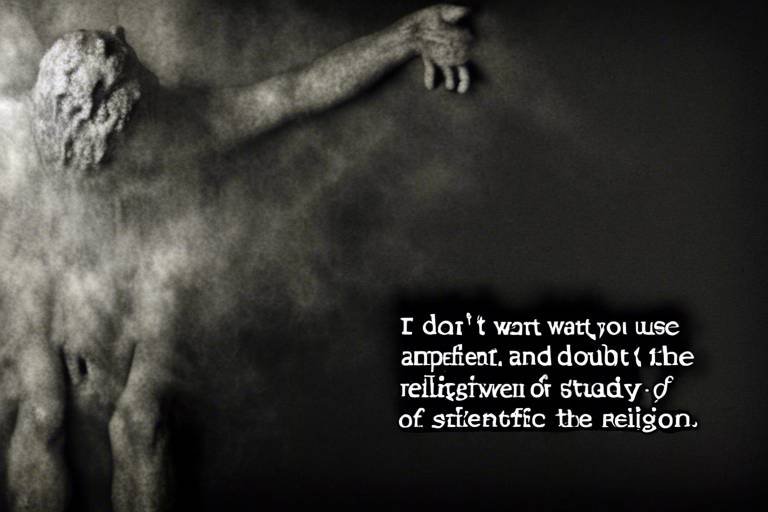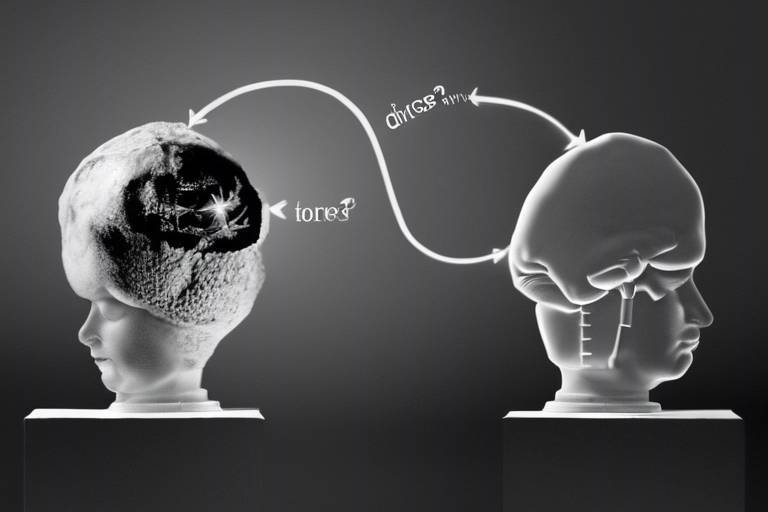The Intricate Dance between Philosophy and Meteorological Sciences
The relationship between philosophy and meteorological sciences is akin to a captivating dance, where each step taken by one discipline influences the other in profound ways. Imagine standing on a windy cliff, the gusts of air swirling around you, and pondering the nature of the weather. It’s not just about the physical phenomena; it’s also about the deeper questions that arise. How do we know what we know about the weather? What ethical responsibilities do we hold when forecasting storms that could devastate communities? These questions are not merely academic; they are at the heart of how we interpret and respond to the world around us.
In this intricate interplay, philosophy provides the foundational principles that inform meteorological practice. Philosophers have long grappled with concepts such as epistemology—the study of knowledge—and how it applies to understanding complex systems like the atmosphere. For meteorologists, this means recognizing that their models and predictions are not just technical outputs but are deeply rooted in philosophical inquiry. Theories of knowledge help shape how data is interpreted, guiding scientists to discern patterns in seemingly chaotic weather events.
Moreover, the ethical dimensions of meteorology cannot be overlooked. When meteorologists issue a forecast, they wield a power that can significantly impact lives. This brings us to the question: what are the ethical implications of these predictions? It’s a tightrope walk between providing accurate information and the potential consequences of that information. The responsibility to communicate risks effectively, while also considering the societal implications of those forecasts, is a task that requires not just scientific expertise but also a profound understanding of ethical principles.
As we delve deeper into this relationship, we uncover layers of meaning that enrich our understanding of both fields. For instance, the philosophical exploration of natural disasters raises questions about fate and randomness. Are these events mere accidents of nature, or do they serve a greater purpose in the human experience? This perspective challenges us to think critically about our place in the universe and how we respond to the forces of nature. The resilience of humanity in the face of adversity becomes a philosophical inquiry in itself, prompting us to reflect on our values and priorities.
In summary, the dance between philosophy and meteorological sciences is a dynamic and evolving relationship. Each discipline informs the other, creating a richer tapestry of understanding that enhances our ability to navigate the complexities of weather and climate. As we continue to explore this interplay, we not only deepen our scientific knowledge but also enrich our philosophical perspectives, leading to a more holistic view of the world.
- How does philosophy influence meteorological research?
Philosophy shapes the foundational questions and ethical considerations that guide meteorological research, influencing how data is interpreted and theories are developed. - What are the ethical responsibilities of meteorologists?
Meteorologists have a duty to provide accurate forecasts and communicate risks effectively to ensure public safety and inform environmental policies. - How do philosophical perspectives affect our understanding of natural disasters?
Philosophical viewpoints can shape our perceptions of fate, randomness, and resilience, influencing how we respond to and interpret natural disasters.

The Philosophical Foundations of Meteorology
The realm of meteorology is not just about numbers, charts, and satellite images; it is deeply rooted in philosophical inquiry that shapes our understanding of weather phenomena. At its core, philosophy provides the framework for epistemology—the study of knowledge and belief—which is crucial for meteorologists as they seek to interpret complex data and predict atmospheric behavior. This interplay between philosophy and meteorology invites us to ponder profound questions: What can we truly know about the weather? How do we differentiate between mere observation and genuine understanding?
To grasp the philosophical foundations of meteorology, one must first recognize the significance of scientific reasoning. Meteorologists rely on various scientific principles to decode the mysteries of the atmosphere. For instance, the laws of thermodynamics and fluid dynamics are essential in explaining how air masses interact and lead to different weather patterns. However, these principles do not exist in a vacuum; they are informed by philosophical considerations regarding causality and the nature of scientific inquiry. The relationship between cause and effect in meteorology is often intricate, prompting scientists to question whether we can ever fully predict weather events or if we are merely observing patterns that we attempt to rationalize.
Furthermore, the philosophy of science encourages meteorologists to adopt a critical stance towards their own methodologies. It urges them to ask questions like: Are we using the right models? Are our assumptions valid? This critical thinking is not just an academic exercise; it has real-world implications. For example, when forecasting extreme weather events, the accuracy of predictions can mean the difference between life and death. Thus, the philosophical foundation of meteorology becomes a matter of ethical responsibility as well as scientific inquiry.
One of the pivotal philosophical concepts in meteorology is the idea of induction. Inductive reasoning allows meteorologists to make generalizations based on specific observations. For instance, after observing that certain atmospheric conditions frequently lead to storms, they can predict future occurrences under similar conditions. However, this inductive leap is fraught with uncertainty. Just because something has happened before does not guarantee it will happen again. This uncertainty is where philosophy becomes essential, as it helps meteorologists navigate the complexities of prediction and fosters a deeper understanding of the limitations of their knowledge.
Moreover, the philosophical discourse surrounding climate change is increasingly relevant. As we grapple with the consequences of human activity on the environment, questions about our responsibilities to future generations emerge. Should we prioritize immediate economic gains over long-term sustainability? The answers to these questions are not merely scientific; they are deeply philosophical and require a collective societal reflection on our values and priorities.
In summary, the philosophical foundations of meteorology enrich our understanding of weather phenomena by providing a framework for critical inquiry, ethical responsibility, and scientific reasoning. As we continue to face the challenges posed by climate change and extreme weather events, the integration of philosophical perspectives into meteorological research will be vital for shaping effective responses and fostering a more resilient society.

The Role of Ethics in Weather Prediction
When we think about weather predictions, we often focus on the science behind it: the data, the models, and the technology. However, there’s an equally important aspect that often goes unnoticed—the ethical implications of these forecasts. Imagine for a moment that a meteorologist predicts a severe storm. The information can save lives, but it can also instill panic. This duality highlights the ethical responsibilities that come with the power of prediction. Meteorologists are not just scientists; they are also communicators, educators, and, in many ways, guardians of public safety.
One of the primary ethical considerations in weather forecasting is the responsibility to provide accurate and timely information. When meteorologists make predictions, they must consider the potential consequences of their forecasts. An inaccurate prediction can lead to unnecessary evacuations, economic losses, and a general sense of mistrust in scientific authority. Therefore, it’s crucial for meteorologists to weigh their words carefully and present their findings with clarity and honesty. This is where the concept of public trust comes into play. If the public believes that meteorologists are committed to transparency and accuracy, they are more likely to heed warnings and take appropriate action.
Moreover, the implications of weather forecasts extend beyond immediate safety concerns. They influence environmental policies and societal behavior. For instance, predictions about climate change can shape legislation, guide funding for disaster preparedness, and alter public perception about environmental issues. This brings us to the ethical dilemma of how to communicate risks effectively. Meteorologists must balance the need to inform the public about potential dangers while avoiding sensationalism that could lead to fear-mongering.
As climate change continues to be a pressing global issue, meteorologists face moral challenges that extend into the realm of ethics. They are often tasked with communicating complex scientific data to the public, which can be a daunting responsibility. The ethical question arises: how do we convey the urgency of climate action without overwhelming or alienating the audience? This is particularly significant when considering the responsibilities to future generations. Scientists must grapple with the implications of their findings and the need to advocate for sustainable practices while still being grounded in their scientific integrity.
Building public trust hinges on transparency in meteorological practices. When people understand the methods and reasoning behind weather predictions, they are more likely to trust the forecasts. This transparency can be achieved through open communication, educational outreach, and community engagement. For example, meteorologists can host workshops or webinars to explain how weather models work and the uncertainties involved in forecasting. Such initiatives not only enhance public understanding but also foster a sense of collaboration between scientists and the community.
Accountability is another crucial aspect of ethical weather forecasting. In the face of natural disasters, meteorologists must take responsibility for the accuracy of their predictions. A reliable forecast can mitigate risks and protect communities, while a failure to predict severe weather accurately can have devastating consequences. This accountability extends to the use of technology and data analytics. As meteorological tools become increasingly sophisticated, it’s essential for professionals in the field to remain vigilant about the ethical use of these technologies. They must continuously evaluate their methods to ensure they are not only effective but also responsible.
In conclusion, the role of ethics in weather prediction is multifaceted and deeply significant. From ensuring accuracy and transparency to grappling with the moral implications of climate change, meteorologists are at the intersection of science and ethics. As we continue to navigate the complexities of weather forecasting, it’s vital for professionals in this field to embrace their ethical responsibilities, ensuring that their predictions serve the greater good of society.
- What are the main ethical responsibilities of meteorologists? Meteorologists must provide accurate forecasts, communicate risks effectively, and maintain transparency to build public trust.
- How does public trust affect weather predictions? Public trust influences how seriously people take weather warnings, which can impact safety and preparedness during severe weather events.
- Why is accountability important in meteorology? Accountability ensures that meteorologists take responsibility for their predictions, which can help protect communities from the consequences of natural disasters.
- What role does communication play in weather forecasting? Effective communication is essential for conveying complex information in a way that is understandable and actionable for the public.

Ethical Dilemmas in Climate Change
Climate change is not just a scientific issue; it's a profound ethical challenge that forces us to confront our responsibilities to one another and to future generations. As we grapple with the consequences of our actions on the environment, we must ask ourselves: what moral obligations do we have to those who will inherit the Earth after us? This question isn't merely academic; it strikes at the heart of how we approach policy decisions, technological innovations, and even our daily choices.
One of the most pressing ethical dilemmas revolves around the concept of intergenerational justice. This principle asserts that we have a duty to consider the rights and needs of future generations when making decisions today. For instance, if we continue to exploit fossil fuels without restraint, we may leave behind a planet that is inhospitable to life. This raises the question: are we willing to sacrifice the well-being of future inhabitants for our immediate comfort and convenience?
Moreover, the disparities in how climate change impacts different populations highlight another ethical concern: equity and justice. Vulnerable communities, often in developing nations, face the brunt of climate-related disasters despite contributing the least to greenhouse gas emissions. This injustice raises critical questions about responsibility. Should wealthier nations, which have historically been the largest polluters, bear a greater burden in combating climate change? The answer is not straightforward, and navigating these waters requires careful ethical consideration.
Furthermore, there’s the ethical dilemma of communication and transparency. Meteorologists and climate scientists bear the responsibility of conveying the urgency of climate change to the public. However, how they communicate these risks can influence public perception and action. For example, overly alarmist messaging may lead to public desensitization, while downplaying the severity can create complacency. Striking the right balance is crucial to foster informed public discourse and encourage proactive measures.
In addressing these ethical dilemmas, we must also consider the role of technology and innovation. While advancements in renewable energy and carbon capture are promising, they come with their own set of ethical concerns. For example, the production of solar panels and wind turbines has environmental and social implications that must be scrutinized. Are we simply shifting the burden from one group to another, or are we genuinely moving towards a sustainable solution?
Ultimately, the ethical dilemmas surrounding climate change compel us to reflect deeply on our values and priorities. As we stand at this crossroads, we must engage in open dialogues about the moral implications of our choices. By fostering a culture of ethical awareness, we can better navigate the complexities of climate change and work towards solutions that are just and equitable for all.
- What are the main ethical dilemmas in climate change? The primary dilemmas include intergenerational justice, equity and justice for vulnerable populations, and the ethics of communication and transparency in conveying climate risks.
- How can we address intergenerational justice in climate policies? By prioritizing sustainable practices and policies that consider the long-term impacts on future generations, we can work towards a more equitable planet.
- Why is equity important in climate change discussions? Equity ensures that those most affected by climate change, often the least responsible for it, receive support and resources to adapt and thrive.

Public Trust and Transparency
In the realm of meteorology, public trust is not just a luxury; it’s a necessity. When communities rely on weather forecasts to plan their daily lives, from deciding whether to carry an umbrella to preparing for a potential natural disaster, the accuracy and reliability of these predictions become paramount. But how does one build this trust? The answer lies in transparency. Meteorologists have a responsibility to communicate their findings and methodologies clearly, allowing the public to understand not just what the forecasts predict, but also the reasoning behind them.
Transparency in meteorological practices can be broken down into several key components:
- Clear Communication: Using language that is accessible to the general public ensures that forecasts are understood by everyone, not just those in the scientific community.
- Open Data: Providing access to the data used in weather predictions allows for independent verification and fosters a sense of trust.
- Explaining Uncertainties: Weather is inherently unpredictable. By openly discussing the uncertainties involved in forecasts, meteorologists can manage public expectations and enhance their credibility.
- Engagement with the Community: Actively engaging with the community through outreach programs and public forums can help demystify meteorological science and build stronger relationships.
Furthermore, the role of social media and technology cannot be overlooked in this context. In today's digital age, information spreads like wildfire, and meteorologists must adapt to this fast-paced environment. By utilizing platforms like Twitter, Facebook, and Instagram, they can provide real-time updates and engage with the public in an interactive manner. This not only helps in disseminating critical information quickly but also allows for a two-way conversation where the community can ask questions and express concerns.
However, the quest for transparency also comes with challenges. For instance, the potential for misinformation in the digital space can undermine the hard work of meteorologists. To combat this, it’s crucial for meteorologists to establish themselves as reliable sources of information. This requires a commitment to ethical standards and consistent messaging. By doing so, they can help to ensure that the public not only receives accurate information but also understands the context and implications of that information.
Ultimately, the relationship between meteorologists and the public is a partnership built on trust and transparency. When people trust the forecasts, they are more likely to heed warnings and take appropriate actions, which can save lives and reduce property damage during severe weather events. Therefore, fostering transparency is not merely an ethical obligation; it is a critical component of effective meteorological practice.
- Why is public trust important in meteorology?
Public trust is essential because it influences how seriously people take weather warnings and forecasts, which can have life-saving implications. - How can meteorologists improve transparency?
Meteorologists can improve transparency by using clear language, providing open access to data, and engaging with the community through various platforms. - What role does social media play in weather communication?
Social media allows meteorologists to share real-time updates and engage directly with the public, enhancing communication and trust.

Accountability in Forecasting
When it comes to weather forecasting, accountability plays a pivotal role in ensuring that meteorologists not only provide accurate predictions but also uphold their responsibility to the public. Imagine a world where forecasters operate without any sense of duty or obligation; the consequences could be catastrophic. Just like a ship captain navigating through a storm, meteorologists must steer their predictions with precision, understanding that lives and livelihoods often hang in the balance.
In the face of natural disasters, the stakes are incredibly high. A missed forecast can lead to unforeseen consequences, leaving communities unprepared for severe weather events. Therefore, meteorologists must embrace accountability by ensuring that their methods and predictions are as reliable as possible. This responsibility can be broken down into several key areas:
- Accuracy of Predictions: It is essential for meteorologists to use the most advanced technology and data to provide forecasts that are as precise as possible. Inaccuracies can lead to significant risks, especially in severe weather scenarios.
- Communication: How meteorologists communicate their findings is equally important. Clear, concise, and accessible information can empower communities to take necessary precautions.
- Continuous Improvement: The field of meteorology is ever-evolving. Meteorologists must commit to ongoing education and improvement of their forecasting methods to adapt to new data and technologies.
Moreover, the ethical implications of accountability extend beyond just forecasting accuracy. Meteorologists must also consider how their predictions influence public behavior and policy decisions. For instance, if a forecast predicts a hurricane but the storm veers off course, the resulting panic can lead to unnecessary evacuations and economic losses. On the flip side, if a storm is underestimated, the lack of preparation can result in devastating consequences. This balancing act is where accountability becomes a moral compass guiding meteorologists through the complex landscape of public safety and environmental stewardship.
In summary, accountability in forecasting is not merely a professional obligation; it is a moral imperative. As meteorologists navigate the unpredictable waters of weather prediction, they must remain vigilant, ensuring that their forecasts serve not just as data points, but as lifelines for communities facing the unpredictable forces of nature. By fostering a culture of accountability, meteorologists can enhance public trust and ultimately save lives in the process.
- What is the role of meteorologists in society? Meteorologists play a crucial role in predicting weather patterns, helping communities prepare for severe weather, and informing public policy on environmental issues.
- How do meteorologists ensure the accuracy of their forecasts? They utilize advanced technology, data analysis, and continuous education to improve their forecasting methods and adapt to new information.
- Why is accountability important in weather forecasting? Accountability ensures that meteorologists provide accurate information, communicate effectively with the public, and take responsibility for the impact of their predictions on society.

Philosophical Perspectives on Natural Disasters
When we think about natural disasters, our minds often race to the immediate chaos and destruction they bring. But have you ever stopped to ponder the deeper questions they raise? Natural disasters are not just events that disrupt our lives; they challenge our understanding of existence, fate, and resilience. Philosophers throughout history have grappled with these concepts, offering insights that help us navigate the emotional and ethical landscapes these disasters create.
One of the most profound philosophical questions surrounding natural disasters is the concept of fate versus randomness. Are these catastrophic events preordained, or are they simply the result of chaotic natural processes? Some philosophical traditions argue that everything happens for a reason, suggesting that disasters serve a greater purpose in the grand tapestry of life. Others contend that randomness reigns supreme, and that we must accept the unpredictable nature of the universe. This dichotomy can lead to varied responses from individuals and communities when faced with disaster. For instance, a belief in fate may inspire a sense of acceptance and resilience, while a belief in randomness might provoke feelings of helplessness and despair.
Moreover, the concept of human resilience plays a crucial role in shaping our philosophical understanding of natural disasters. When faced with adversity, human beings often exhibit remarkable strength and creativity. This resilience is not just a survival mechanism; it can also be seen as a testament to the human spirit. Philosophers like Friedrich Nietzsche have famously stated that what doesn’t kill us makes us stronger, suggesting that the challenges posed by disasters can lead to personal and collective growth. This perspective encourages us to view disasters not only as tragedies but also as opportunities for transformation and renewal.
To better understand these philosophical perspectives, we can consider the various ways people interpret and respond to natural disasters. Here are a few key themes that emerge:
- Existential Reflection: Disasters force individuals to confront their mortality and the fragility of life, prompting deep existential questions about purpose and meaning.
- Community and Solidarity: In the aftermath of disasters, communities often come together, fostering a sense of unity and shared purpose that transcends individual differences.
- Ethical Responsibility: Philosophical inquiry raises questions about our moral obligations to help those affected by disasters and to prepare for future events.
Furthermore, these perspectives can inform how we approach disaster preparedness and response. By integrating philosophical insights into our planning and policies, we can create more resilient communities that not only survive disasters but thrive in their aftermath. This approach emphasizes the importance of education, awareness, and ethical responsibility in mitigating the impacts of natural disasters.
In conclusion, the interplay between philosophy and natural disasters reveals a rich tapestry of human thought and experience. By examining the philosophical perspectives on fate, resilience, and community, we can gain a deeper understanding of the challenges posed by these events and the ways in which they shape our lives. Ultimately, embracing these philosophical inquiries can empower us to face the unpredictability of nature with courage, compassion, and a renewed sense of purpose.
- What is the philosophical significance of natural disasters? Natural disasters challenge our understanding of fate, randomness, and human resilience, prompting deep existential and ethical questions.
- How can philosophy help in disaster preparedness? By integrating philosophical insights, we can foster community resilience and ethical responsibility in preparing for and responding to disasters.
- What role does human resilience play in the aftermath of disasters? Human resilience can transform the experience of disaster into an opportunity for growth and community solidarity.

The Impact of Philosophy on Meteorological Research
The relationship between philosophy and meteorological research is like a dance, intricate and beautifully intertwined. Philosophy, with its deep inquiries into the nature of knowledge and understanding, profoundly influences how meteorologists approach their work. At its core, meteorology isn’t just about collecting data; it’s about interpreting that data in a way that makes sense of our world. This is where philosophical inquiry comes into play. It encourages scientists to question the very foundations of their methodologies, urging them to consider the implications of their findings and the assumptions they make along the way.
One of the most significant impacts of philosophy on meteorological research is in the area of epistemology, the study of knowledge. Meteorologists must grapple with questions such as: What do we really know about weather patterns? How do we know that our models accurately predict future conditions? These questions push scientists to refine their methods and seek more reliable data sources. For instance, the philosophical approach encourages the integration of various types of knowledge, from traditional observational techniques to advanced computational models. This blending of perspectives can lead to a more comprehensive understanding of complex weather systems.
Moreover, philosophy fosters critical thinking, which is crucial in the field of meteorology. When meteorologists are encouraged to explore alternative explanations for weather phenomena, they become more adept at identifying anomalies and unexpected patterns. This critical lens can lead to groundbreaking discoveries, as scientists learn to question established norms and challenge existing theories. For example, consider the case of climate modeling—philosophical inquiry into the assumptions underlying these models can reveal biases or gaps in our understanding, prompting researchers to adjust their approaches and potentially improve predictive accuracy.
In addition, interdisciplinary approaches are becoming increasingly important in meteorological research. By collaborating with philosophers, meteorologists can gain insights that enhance their work. For instance, a philosopher might help a meteorologist frame their research questions in a way that considers ethical implications, societal impacts, or even the philosophical underpinnings of scientific inquiry itself. This collaboration can lead to innovative methodologies that not only advance scientific knowledge but also address pressing environmental concerns.
The impact of philosophy extends beyond research methodologies; it also shapes the way meteorologists communicate their findings to the public. In an era where misinformation can spread like wildfire, the ability to convey complex scientific concepts in an accessible manner is essential. Philosophical training can equip scientists with the skills to articulate their ideas clearly and persuasively, fostering a more informed public discourse around weather and climate issues.
| Philosophical Influence | Impact on Meteorology |
|---|---|
| Epistemology | Refines methodologies and data interpretation |
| Critical Thinking | Encourages questioning of assumptions and theories |
| Interdisciplinary Collaboration | Enhances research through diverse perspectives |
| Communication Skills | Improves public understanding of scientific findings |
In summary, the impact of philosophy on meteorological research is profound and multifaceted. It encourages a deeper understanding of knowledge, promotes critical inquiry, and fosters collaboration across disciplines. As we continue to face the challenges of climate change and extreme weather events, the integration of philosophical insights into meteorological research will be crucial for developing effective strategies and solutions. So, the next time you check the weather, remember that behind those forecasts lies a rich tapestry of philosophical thought, shaping our understanding of the world around us.
- How does philosophy influence scientific research? Philosophy encourages critical thinking and questioning of established norms, leading to more robust scientific inquiry.
- What role does ethics play in meteorology? Ethics is crucial in weather forecasting, as it guides meteorologists in making responsible predictions that affect public safety.
- Can philosophy improve public understanding of weather science? Yes, philosophical insights can enhance communication strategies, making complex scientific concepts more accessible to the public.

Interdisciplinary Approaches
The world of meteorology is not just about understanding weather patterns or predicting storms; it's a vibrant tapestry woven from various disciplines that enrich our comprehension of atmospheric phenomena. When we talk about in meteorological research, we are essentially discussing how different fields of study come together to create a more holistic understanding of weather and climate. Imagine a grand orchestra where each instrument contributes to a beautiful symphony; similarly, disciplines like philosophy, environmental science, and even sociology play crucial roles in enhancing meteorological studies.
One of the most compelling aspects of integrating philosophy into meteorology is how it encourages researchers to question the underlying assumptions of their work. For instance, when meteorologists predict a severe weather event, they rely heavily on models and data. However, philosophical inquiry prompts them to examine the epistemological foundations of these models. Are we truly capturing the complexity of the atmosphere, or are we merely simplifying it for convenience? This kind of critical questioning can lead to more robust and reliable forecasts, ultimately benefiting society at large.
Moreover, collaboration between meteorologists and philosophers can inspire innovative research methodologies. By applying philosophical frameworks to meteorological data, scientists can explore new avenues for understanding climate change and its implications for human society. For example, the concept of resilience—often discussed in philosophical circles—can be applied to how communities adapt to changing weather patterns. This approach fosters a deeper understanding of not just the meteorological data but also the human experience intertwined with it.
In addition to philosophy, other disciplines such as geography, psychology, and even art can significantly enhance meteorological research. Geographers can provide insights into how physical landscapes influence weather patterns, while psychologists can help us understand public perception of weather forecasts and climate change. Artists, on the other hand, can translate complex meteorological data into visual narratives that resonate with the public, making the science more accessible and engaging.
By fostering interdisciplinary collaboration, we can cultivate an environment where innovative ideas flourish. This not only enhances the scientific rigor of meteorological research but also ensures that the findings are relevant and applicable to real-world challenges. Imagine a scenario where meteorologists, philosophers, and social scientists work together to develop comprehensive climate action plans. Such collaborations could lead to policies that are not only scientifically sound but also ethically responsible and socially equitable.
In summary, interdisciplinary approaches in meteorology are not just beneficial; they are essential for advancing our understanding of complex weather phenomena. By embracing insights from various fields, we can create a richer, more nuanced picture of the atmosphere and its interactions with human society. This holistic perspective is crucial as we face the pressing challenges of climate change and extreme weather events in the 21st century.
- What is the importance of interdisciplinary approaches in meteorology?
Interdisciplinary approaches allow for a more comprehensive understanding of weather phenomena by integrating insights from various fields, leading to innovative research and practical solutions.
- How does philosophy contribute to meteorological research?
Philosophy encourages critical thinking and questioning of assumptions, which can improve the reliability and robustness of weather predictions.
- Can art play a role in meteorology?
Yes! Art can help communicate complex meteorological data in a way that is engaging and accessible to the public, fostering a better understanding of climate issues.

Critical Thinking in Meteorology
When we think about meteorology, we often picture scientists hunched over computers, crunching numbers and analyzing data to predict the weather. However, the true essence of meteorology is much more than just data analysis; it is a dynamic interplay of critical thinking and scientific reasoning. Critical thinking in meteorology involves questioning existing assumptions, analyzing various data sources, and deriving innovative hypotheses about weather phenomena. It is this very intellectual curiosity that propels the field forward, allowing meteorologists to make sense of the complex and ever-changing nature of our atmosphere.
At its core, critical thinking encourages meteorologists to challenge the status quo. For instance, when faced with unexpected weather patterns, a critical thinker will not simply accept the traditional explanations. Instead, they will delve deeper, asking questions like:
- What data supports this anomaly?
- Could there be external factors influencing these changes?
- How reliable are our forecasting models in this context?
This kind of questioning is crucial because the atmosphere is influenced by a myriad of factors, from ocean currents to human activity. By regularly revisiting and reassessing their models and approaches, meteorologists can develop a more nuanced understanding of weather patterns. This is particularly important in an era of rapid climate change, where old models may no longer apply, and new, innovative approaches are necessary to understand evolving weather phenomena.
Moreover, critical thinking fosters collaboration across disciplines. Meteorologists often work alongside climatologists, environmental scientists, and even philosophers to gain a comprehensive understanding of weather and climate. This interdisciplinary approach not only enriches meteorological research but also encourages the sharing of diverse perspectives, which can lead to groundbreaking discoveries. For example, philosophical inquiries into the nature of reality and human perception can inspire new ways of thinking about weather prediction and its implications on society.
Furthermore, critical thinking is essential in the interpretation of data. Meteorologists must navigate through vast amounts of information, distinguishing between noise and signal. This requires a keen analytical eye and the ability to synthesize data from various sources, including satellite imagery, ground reports, and historical records. The ability to critically assess the reliability of these sources is paramount. A well-rounded meteorologist must be aware of potential biases or inaccuracies that could skew their interpretations.
In summary, critical thinking is not just an optional skill for meteorologists; it is a fundamental component of their work. It empowers them to challenge assumptions, collaborate across disciplines, and interpret data with a discerning eye. As the field of meteorology continues to evolve, the role of critical thinking will only become more pronounced, enabling scientists to navigate the complexities of our atmosphere with confidence and creativity.
- What is critical thinking in meteorology?
Critical thinking in meteorology involves questioning existing assumptions, analyzing various data sources, and deriving innovative hypotheses about weather phenomena. - How does critical thinking affect weather predictions?
It allows meteorologists to challenge traditional models and develop new, more accurate forecasting methods based on current data. - Why is interdisciplinary collaboration important in meteorology?
Collaboration with other disciplines can lead to new insights and innovative approaches to understanding complex weather patterns.
Frequently Asked Questions
- What is the relationship between philosophy and meteorology?
The relationship between philosophy and meteorology is a fascinating one. Philosophy provides the foundational theories that underpin meteorological principles, helping scientists understand complex weather patterns and climate phenomena. It encourages critical thinking and ethical considerations in research and forecasting, ultimately enriching our understanding of the weather and its impact on human life.
- How does ethics play a role in weather forecasting?
Ethics in weather forecasting is crucial as it shapes the responsibilities of meteorologists. Accurate predictions can significantly impact public safety, policy-making, and environmental awareness. Meteorologists must communicate risks transparently and ethically, ensuring that the information they provide is reliable and understandable to the public.
- What are the ethical dilemmas faced by meteorologists regarding climate change?
Meteorologists encounter various ethical dilemmas when addressing climate change, such as the responsibility to inform future generations about potential risks and the moral implications of their findings. They must balance scientific integrity with the need to communicate urgent issues effectively, which can sometimes lead to conflicts between scientific data and public perception.
- Why is public trust important in meteorology?
Public trust is essential in meteorology because it fosters cooperation between meteorologists and the communities they serve. When people trust the forecasts and the scientists behind them, they are more likely to heed warnings and take necessary precautions during severe weather events. Transparency and ethical communication are key factors in building and maintaining this trust.
- What does accountability in forecasting mean?
Accountability in forecasting refers to the responsibility meteorologists have to provide accurate and timely information, especially during natural disasters. Reliable predictions can save lives and reduce damage, making it imperative for meteorologists to uphold high standards in their work. This accountability extends to how they communicate uncertainties and risks to the public.
- How does philosophy influence meteorological research?
Philosophy influences meteorological research by shaping research methodologies and encouraging scientists to question assumptions. It promotes interdisciplinary approaches, allowing for innovative perspectives that can lead to new theories and better understanding of weather phenomena. Philosophical inquiry encourages meteorologists to explore alternative explanations and deepen their analyses.
- What are interdisciplinary approaches in meteorology?
Interdisciplinary approaches in meteorology involve collaboration between meteorologists and experts from other fields, such as philosophy, environmental science, and social sciences. This collaboration can lead to innovative solutions and a more comprehensive understanding of complex weather systems and their societal implications, ultimately enhancing research and education in meteorology.
- Why is critical thinking important in meteorology?
Critical thinking is vital in meteorology as it empowers scientists to challenge existing assumptions and explore new ideas. By applying critical thinking skills, meteorologists can better interpret data, assess risks, and develop more effective forecasting methods. This analytical mindset is essential for advancing the field and responding to the ever-evolving challenges posed by weather and climate change.



















